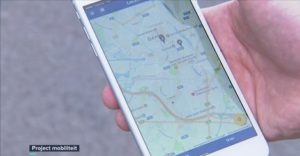(English version below)
Mensen die een wagen bezitten weten vaak niet hoeveel een wagen precies kost, omdat er vaak op voorhand werd betaald voor het autogebruik. Om de precieze kost van een wagen te bepalen, moet er enerzijds rekening worden gehouden met vaste kosten (aankoopprijs, verzekering en verkeersbelasting) en anderzijds met variabele kosten (brandstof en onderhoud).
Touring vraagt zich nu af hoeveel het kost om het verplaatsingsgedrag van mensen te veranderen ten voordele van meer duurzame alternatieven dan de eigen wagen. Touring wil daarom als dienst een mobiliteitspakket aanbieden met duurzame alternatieven. Deze dienst noemt Mobility as a Service of kortweg MaaS genoemd en gebruikers kunnen via de MaaS-applicatie op hun smartphone gebruikmaken van deze multimodale routeplanner. Hierbij heeft de gebruiker toegang tot verschillende mobiliteitsdiensten zoals bussen, trams, deelwagens, huurwagens, taxi’s, deelfietsen, … Omdat de MaaS-app al deze mobiliteitsdiensten bundelt, is het veel makkelijker om deze diensten te ontdekken en te gebruiken op een laagdrempelige manier.
Het Instituut voor Duurzame Mobiliteit (IDM) van de Universiteit Gent heeft ongeveer 90 testpersonen geselecteerd die met een gemiddeld mobiliteitsbudget van €250/maand de MaaS-app in Gent uittesten van april tot juni 2017. Neem een kijkje via volgende links hoe het project verloopt:
http://deredactie.be/cm/vrtnieuws/videozone/programmas/journaal/2.50093?video=1.2992296
http://deredactie.be/cm/vrtnieuws/binnenland/1.2992125
Touring and IDM working together on a multimodal app
People who own a car often do not know how much a car exactly costs, because car use is often paid in advance. In order to determine the exact cost of a car, it is necessary to take into account fixed costs (purchase price, insurance and traffic tax) and variable costs (fuel and maintenance).
Touring wonders how much it costs to change people’s travel behavior in favour of more sustainable alternatives than the personal car. Touring therefore wants to offer a mobility package as a service with sustainable mobility alternatives. This service calls Mobility as a Service or shortly MaaS and users can use this multimodal route planner via the MaaS application on their smartphone. This allows the user to access various mobility services such as buses, trams, shared cars, rental cars, taxis, shared bikes, etc. Because the MaaS app combines all these mobility services, it is much easier to discover and use these services in a low-threshold manner.
The Network for Sustainable Mobility Research or IDM (Instituut voor Duurzame Mobiliteit) from Ghent University has selected about 90 participants who are testing the Maas app in Ghent with an average mobility budget of €250/month from April until June 2017. Take a look at the following websites to learn more about the progress of the project (in Dutch):
http://deredactie.be/cm/vrtnieuws/videozone/programmas/journaal/2.50093?video=1.2992296
http://deredactie.be/cm/vrtnieuws/binnenland/1.2992125

